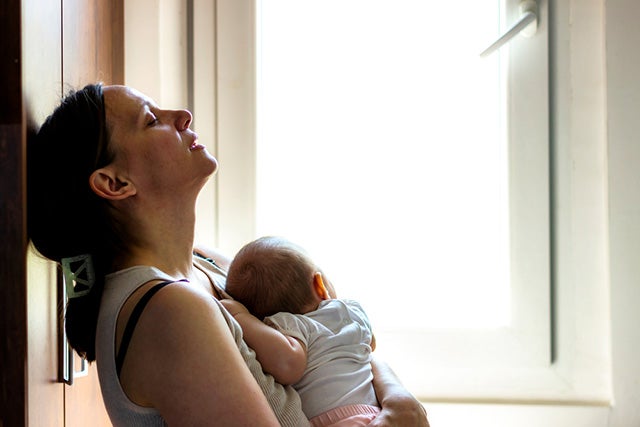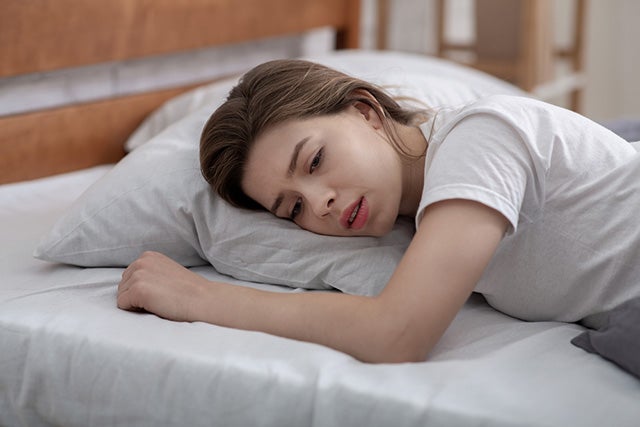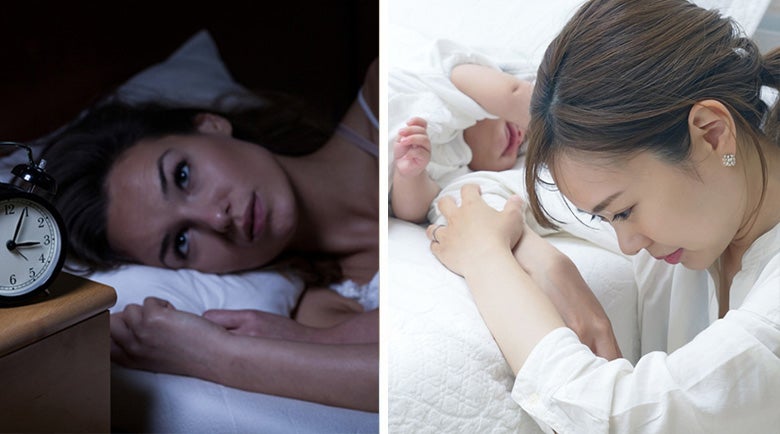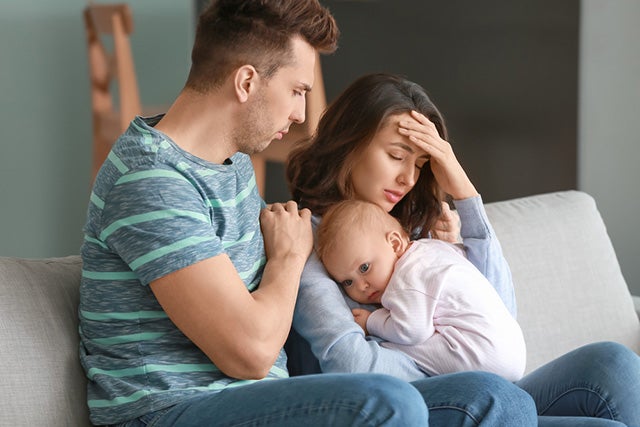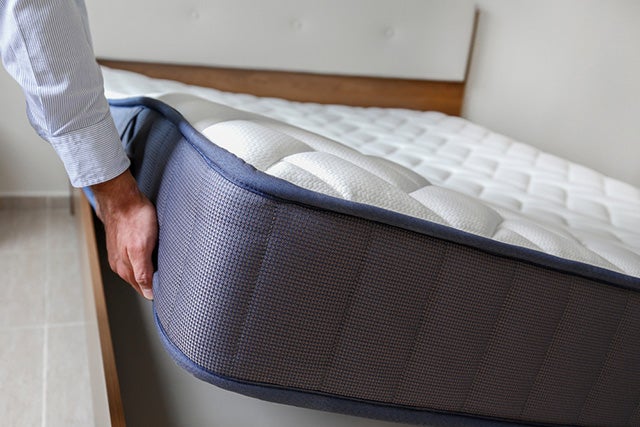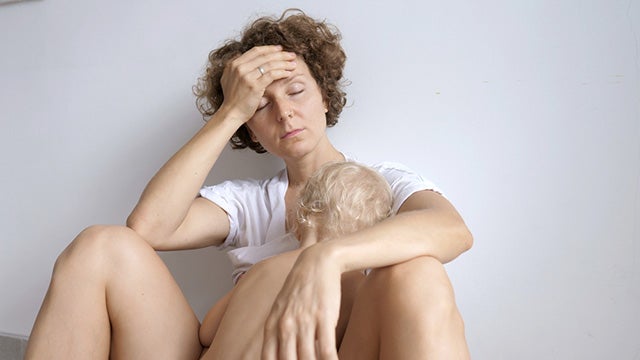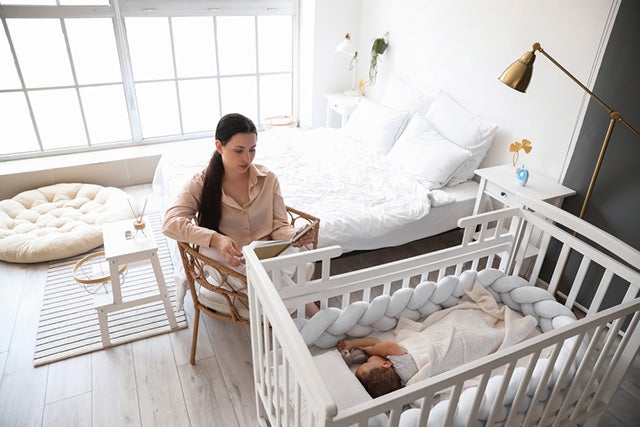Are you having difficulty sleeping as a new mom? It is not unusual for a new mother to experience insomnia soon after giving birth. I suffered from this for several years after having both my children. This can come from many factors, such as changes in the body’s hormone levels, emotional upheaval, and sleep deprivation.
There are ways to deal with postpartum insomnia, but it’s important to seek help if the problem persists. This article will explore what causes postpartum insomnia and offer tips on getting better sleep.
What Is Insomnia?
Insomnia is a condition characterized by constant difficulty falling or staying asleep. Common symptoms associated with insomnia include difficulty falling asleep, frequent nighttime waking, and waking up feeling tired or unrefreshed.
While the underlying causes of insomnia can vary widely, it is generally considered a psychological condition (such as stress or anxiety) or a physiological condition (such as disrupted sleep cycles or restless leg syndrome).
In addition to taking steps to manage the underlying cause of insomnia, several strategies can help to promote better sleep and mitigate its effects. These include establishing a regular bedtime routine and avoiding caffeine late in the day.
You might be interested: Every Little Thing You Need to Know About Insomnia
What Is Postpartum Insomnia?
Postpartum insomnia is a condition that can affect women after giving birth. This type of insomnia typically occurs due to hormonal changes in the body, and it can cause persistent trouble sleeping and daytime fatigue.
Some common symptoms of postpartum insomnia include morning headaches, irritability, and feeling overwhelmed or overstimulated. There’s no end-all cure for this condition, but there are several tips that women can try to help alleviate its symptoms.
For example, keeping a regular sleep schedule is important, as disrupted sleep patterns are often associated with postpartum insomnia. Other strategies for managing this condition include avoiding large meals before bedtime and caffeine late in the day.
Insomnia Vs. Postpartum Insomnia
Insomnia and postpartum insomnia refer to two different types of sleep disorders. While the former is common and affects people of all ages, the latter is specific to women who have recently given birth. There are some other key differences between them.
| Insomnia | Postpartum Insomnia |
|
|
You might want want to read this: The Relationship Between Sleep and Depression
What Causes Postpartum Insomnia?
Postpartum insomnia, or sleep disturbances that occur soon after having a baby, can have many different causes. Some of the most common factors include hormonal changes, fatigue and exhaustion, stress and anxiety related to caregiving responsibilities, and disruptions to sleep schedules due to feeding and diaper-changing schedules.
In addition, many new mothers struggle with difficulty getting back into their normal sleep routine once the baby is born. This can lead to persistent feelings of tiredness and low moods, further exacerbating existing mental health issues like depression or anxiety.
Importance of Getting Proper Rest After Having a Baby
After having a baby, new moms must get plenty of rest. During those tumultuous first few months after giving birth, your body is going through a tremendous amount of physical and hormonal changes. It is essential to give yourself time to rejuvenate and recover.
In addition to regular sleep, you should also try to take periodic breaks during the day where you can lie down or relax in a comfortable position. Other important strategies for replenishing your energy include:
- Making healthy food choices.
- Engaging in light exercises like walking or yoga.
- Getting support from family and friends.
By focusing on your own well-being after having a baby, you can ensure that you can meet the demands of this exciting but exhausting time in your life.
Tips for Dealing with Postpartum Insomnia
Postpartum insomnia usually requires cognitive behavioral therapy. To improve your sleeping habits after giving birth, here are some tips that helped me get through it.
Get a New Mattress
Take a close look at your bed. How old is it? Does it sink in the middle? Does it offer the support you need? Sometimes, our poor sleep issues come from the bed itself, and a new mattress might be in order.
Understand What Postpartum Insomnia Is
Postpartum insomnia is a type of insomnia that can occur in the weeks or months after giving birth. It is often caused by hormonal changes, sleep deprivation, and anxiety. While it can be difficult to deal with, I have a few ideas that you can do to help ease the symptoms of postpartum insomnia.
Get Plenty of Rest During the Day
One of the best tips to combat postpartum insomnia is to get plenty of rest during the day. This may mean taking a nap when your baby is sleeping or taking an extra hour or two at night. If you are able to get more rest during the day, you will be less likely to experience insomnia at night.
Establish a Bedtime Routine
Another helpful tip for dealing with postpartum insomnia is to establish a bedtime routine. This may include taking a warm bath, reading a book, or doing some light stretching before bed. Having a set routine will help to signal to your body that it is time to sleep and make it easier to fall asleep.
Avoid Caffeine and Alcohol
Caffeine and alcohol can both interfere with sleep and should be avoided if you are dealing with postpartum insomnia. If you do drink caffeine, be sure to do so early in the day so that it does not keep you awake at night. Avoid alcohol, as it can disrupt sleep and cause dehydration.
Keep a Sleep Diary
Keeping a sleep diary can help you understand your sleep patterns and identify potential insomnia triggers. In your sleep diary, be sure to track how long it takes to fall asleep. Also, track how many times you wake up during the night and how rested you feel in the morning.
Talk to Your Doctor
If you struggle with postpartum insomnia, talk to your doctor. They may be able to prescribe medication or refer you to a therapist who can help you manage your anxiety and stress levels.
You might be interested: The Science Behind Getting Healthier Sleep
The Bottom Line
Symptoms of insomnia include difficulty falling asleep, staying asleep, or getting restful sleep. Postpartum insomnia is a form of insomnia that can affect women after giving birth. Postpartum insomnia can cause fatigue, mood swings, and problems with breastfeeding.
Most cases of postpartum insomnia resolve on their own within a few months. However, if symptoms persist longer than six months, I recommend that you seek professional help.
Photo credit: Arsenii Palivoda/Shutterstock;
Prostock-studio/Shutterstock; Pixel-Shot/Shutterstock;
Ground Picture/Shutterstock; metamorworks/Shutterstock;
evrymmnt/Shutterstock; Sia Footage/Shutterstock;
Pixel-Shot/Shutterstock; Da Antipina/Shutterstock;
Tony Stock/Shutterstock; Dmytro Zinkevych/Shutterstock;
Jelena Stanojkovic/Shutterstock
Frequently Asked Questions
Why can't I sleep after having a baby?
There are so many possible causes for this lack of sleep. Changes in hormone levels due to childbirth can affect sleep quality, as can the altered balance of brain chemicals like serotonin and dopamine that regulate mood and body function. In addition, new mothers may experience increased stress or anxiety levels during this critical period in their lives.
How long does insomnia last?
Insomnia may be acute for a short period or can last longer (chronic). Acute insomnia can last anywhere from one night to several weeks. Chronic insomnia is defined as occurring at least three nights per week for a period of three months or longer.
Does postpartum insomnia go away on its own?
Most new mothers have a decline in their symptoms of postpartum depression over time, but, if your symptoms are severe, medication and therapy may assist in reducing your symptoms so that you can function and get the restorative sleep you so desperately need.
